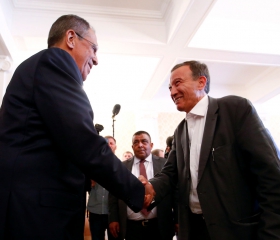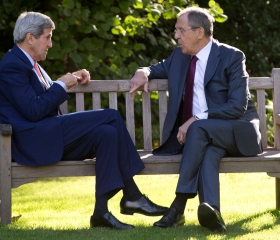The Assad government is guilty of terrible crimes. But a gradual evolution of Assad's dictatorship into a responsible government is at least as likely as a battlefield victory of "moderates" over Assad, al-Qaeda, and the Islamic State followed by their gracious acceptance of former enemies into a pluralist, inclusive Syria.
Russia's diplomatic and material support for Syrian President Bashar al-Assad has been universally condemned by western governments and in the western press. Russia admits that it provides humanitarian aid and "defensive" weaponry to the Syrian government. It has also (along with China) vetoed anti-Assad resolutions at the United Nations Security Council. This has left many in the west wondering: how can any country support such a monster?
There is no doubt that President Assad has blood on his hands – lots of it. So did Saddam Hussein of Iraq and Muammar Gaddafi of Libya. Both these dictators were endorsed and armed by western powers – including the United States – before they were vilified and deposed. If western condemnation of murderous dictators has one rationalization, it is "better late than never."
Time has proved Russia right to counsel caution in dealing with Iraq and Libya. Certainly Saddam and Gaddafi were monsters. Certainly the people of Iraq and Libya deserved civil liberties and representative government. Certainly the United States and its western allies hoped that by toppling Saddam and Gaddafi they would bring peace and prosperity to these countries.
If only the "right" people had come to power after the wars in Iraq and Libya these hopes might have been fulfilled.
Unfortunately, the "right" people did not come to power. The reasons are hotly debated and no one can ever know what might have been. What we do know is that hundreds of thousands of people have lost their lives, millions of people live in fear, and a generation of young people growing up in fractured societies are ripe for radicalization.
Similarly in Egypt the United States, the European Union, and the western intelligentsia also supported a popular revolution against a decrepit autocrat – until the "wrong" people came to power, the democratically elected Muslim Brotherhood government of Mohamed Morsi.
An American-endorsed counter-revolution restored a murderous military dictatorship in Egypt. Egypt's new autocrat, Abdel Fattah el-Sisi, has been embraced by the United States and the European Union. Ten American Apache attack helicopters are now on their way to Egypt – hardly "defensive" weapons by any stretch of the imagination.
In the twenty-first century, Russia has generally been a conservative influence in international affairs. It has stood against adventurism and supported the status quo. It has applied what in public health is known as "the precautionary principle": in the absence of positive knowledge that an action will turn out well, it is better to do nothing than to roll the dice and hope for the best. First do no harm.
Applied to international affairs, the precautionary principle may be morally unsatisfying, but recent western adventures in idealistic interventionism seem to reaffirm its good sense.
The precautionary principle does not always imply inaction. Sometimes it is obvious to everyone that positive action is required: brutal international criminal armies like Boko Haram and the Mexican drug cartels must be suppressed, even if the governments opposing them may themselves have questionable human rights records. When there is universal consensus – even among countries that usually quarrel – it is reasonable to assume that action is warranted.
At other times there are differences of opinion that reflect major differences in perspective across countries. The United Nations Security Council exists to address these differences. When the large, nuclear-armed global powers that hold veto rights on the Security Council disagree on the appropriateness of armed intervention or material support for opposing sides in a conflict, the world should take note. The precautionary principle should be applied.
Had the United States and its allies listened to Russian (and Chinese) advice to take a more conservative approach to regime change in Iraq and Libya, it is likely that much human suffering would have been avoided. It is hard to imagine that events in either country could have turned out worse than they did.
Now a sadly familiar story is unfolding in Syria. Since 2011 hundreds of thousands of Syrians have been killed. Out of a population of 23 million, 3 million have fled the country and 6 million have been internally displaced. Western Europe is inundated with assylum-seekers. The barbaric Islamic State organization has flourished.
Like the Saddam, Gaddafi, and Mubarak regimes, the Assad government already had a terrible human rights record before the 2011 conflict began. That bad record has become much worse over the course of the civil war. But if Assad falls, will he be replaced by the "right" people? Will Assad's successors be liberal democrats who support peace and human rights?
If Assad is succeeded by al-Qaeda or Islamic State, we all know the answer. But even if Assad is succeeded by America's hand-picked "moderate" opposition, will there be no reprisal killings? Will people whose families were murdered by Assad's forces show mercy to Assad's supporters? Is any positive outcome to the Syrian civil war at all likely?
Questions like these are the imponderables of history. But Russia was right to counsel caution at the outset of hostilities. It is not clear that Russia is wrong to support the Assad government today.
The Assad government is guilty of terrible crimes. But a gradual evolution of Assad's dictatorship into a responsible government is at least as likely as a battlefield victory of "moderates" over Assad, al-Qaeda, and the Islamic State followed by their gracious acceptance of former enemies into a pluralist, inclusive Syria.
Every country has problems and every country falls short of its ideals. Like the United States, Russia is no exception to this rule. But right or wrong, Russia's positions on international affairs should be taken seriously in the west. Life and death decisions should not be taken lightly. In international affairs as in public health, the precautionary principle should prevail.






